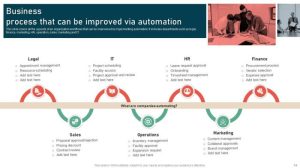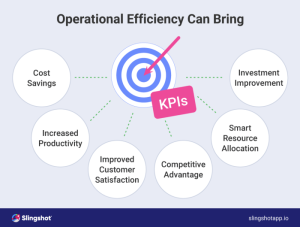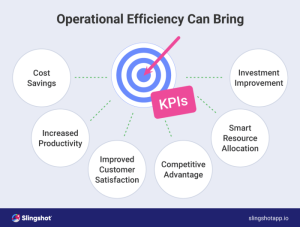
With Digital Transformation for Operational Efficiency at the forefront, this paragraph opens a window to an amazing start and intrigue, inviting readers to embark on a storytelling journey filled with unexpected twists and insights.
Digital transformation has become a crucial strategy for businesses looking to enhance their operational efficiency and stay ahead in today’s competitive landscape. By leveraging technology and data analytics, companies can revolutionize their processes to achieve optimal performance and success. Let’s delve deeper into the realm of digital transformation and explore its impact on operational efficiency.
Digital Transformation Overview

Digital transformation refers to the integration of digital technology into all aspects of a business, fundamentally changing how it operates and delivers value to customers. In the context of operational efficiency, digital transformation aims to streamline processes, automate tasks, and improve overall performance.
Importance of Digital Transformation for Businesses
Digital transformation is crucial for businesses looking to stay competitive in today’s fast-paced and technology-driven world. By embracing digital tools and strategies, companies can enhance productivity, reduce costs, and enhance customer experiences.
- Increased Efficiency: Digital transformation allows businesses to automate manual processes, leading to increased efficiency and productivity.
- Enhanced Decision Making: By leveraging data analytics and real-time insights, organizations can make informed decisions quickly, improving overall performance.
- Improved Customer Experience: Digital transformation enables businesses to better understand customer needs and preferences, leading to personalized experiences and increased satisfaction.
Examples of Industries Benefiting from Digital Transformation
Various industries have embraced digital transformation to drive operational efficiency and innovation. Some examples include:
Healthcare: Hospitals and healthcare providers are using digital tools such as telemedicine and electronic health records to streamline patient care and improve outcomes.
Retail: Online retailers are implementing digital technologies like AI-driven recommendations and mobile apps to enhance the shopping experience and increase sales.
Manufacturing: Factories are adopting automation and IoT devices to optimize production processes, reduce downtime, and improve quality control.
Key Components of Digital Transformation

Successful digital transformation requires a combination of essential elements to drive operational efficiency and innovation. Technology plays a crucial role in enabling organizations to adapt to the digital landscape, while data analytics provides valuable insights for informed decision-making.
Essential Elements for Digital Transformation:
- Clear Vision and Strategy: Establishing a clear roadmap and objectives for digital transformation initiatives is essential to align the organization towards a common goal.
- Leadership Support: Strong leadership commitment and sponsorship are vital to drive change and foster a culture of innovation within the organization.
- Talent and Skills: Investing in talent development and acquiring the necessary digital skills are crucial for leveraging technology effectively.
- Agile Processes: Implementing agile methodologies and flexible processes allows organizations to adapt quickly to changing market demands.
- Customer-Centric Approach: Putting the customer at the center of digital transformation efforts ensures that solutions meet their needs and enhance their experience.
Role of Technology in Driving Digital Transformation:
Technology serves as the backbone of digital transformation, enabling organizations to streamline operations, enhance productivity, and deliver innovative solutions. By leveraging technologies such as cloud computing, artificial intelligence, Internet of Things (IoT), and robotic process automation, businesses can automate repetitive tasks, improve decision-making processes, and create new revenue streams.
Significance of Data Analytics in the Process:
Data analytics plays a critical role in digital transformation by providing organizations with valuable insights derived from data. By analyzing large datasets, organizations can identify trends, patterns, and opportunities to optimize operations, personalize customer experiences, and make informed strategic decisions. Data-driven insights enable organizations to stay competitive in the digital age and drive continuous improvement across all aspects of the business.
Improving Operational Efficiency
Operational efficiency refers to the ability of an organization to utilize resources effectively to maximize output while minimizing waste. It plays a crucial role in enhancing organizational performance by reducing costs, improving productivity, and enhancing customer satisfaction.Digital transformation has revolutionized the way businesses operate by incorporating technology to streamline processes and increase efficiency. It enables organizations to automate manual tasks, optimize workflows, and make data-driven decisions in real-time.
By leveraging digital tools, businesses can enhance collaboration, communication, and decision-making across departments, leading to improved operational efficiency.
Examples of Digital Tools for Operational Efficiency
- Customer Relationship Management (CRM) software: CRM systems help businesses manage customer interactions, track sales leads, and improve customer satisfaction. By centralizing customer data and automating communication processes, organizations can enhance customer relationships and increase operational efficiency.
- Enterprise Resource Planning (ERP) software: ERP systems integrate various business functions such as finance, human resources, and supply chain management into a single platform. This streamlines processes, eliminates data silos, and provides real-time insights for better decision-making.
- Workflow Automation tools: Workflow automation tools enable organizations to automate repetitive tasks, standardize processes, and reduce manual errors. By automating workflows, businesses can improve efficiency, reduce operational costs, and accelerate project timelines.
Challenges and Solutions
In the process of digital transformation for operational efficiency, organizations often encounter various challenges that can hinder the successful implementation of digital strategies. It is essential to identify these challenges and come up with effective solutions to mitigate risks and ensure a smooth transition.
Legacy Systems Integration
One of the common challenges faced during digital transformation is the integration of legacy systems with new digital technologies. Legacy systems are often outdated and not designed to work seamlessly with modern digital solutions.
- Invest in middleware solutions that act as a bridge between legacy systems and new digital applications.
- Consider gradually phasing out legacy systems and replacing them with more compatible solutions.
- Collaborate with IT experts to develop custom integrations that ensure data continuity and system interoperability.
Cultural Resistance to Change
Resistance to change from employees and stakeholders can pose a significant challenge during digital transformation initiatives. People may be reluctant to adopt new technologies or processes, leading to a lack of engagement and cooperation.
- Provide comprehensive training and support to employees to help them understand the benefits of digital transformation.
- Create a culture of innovation and open communication to encourage buy-in from all levels of the organization.
- Involve employees in the decision-making process and address their concerns to ensure a smooth transition.
Data Security and Privacy Concerns
With the increasing use of digital technologies, data security and privacy have become major concerns for organizations. Ensuring the protection of sensitive information is crucial to maintaining trust with customers and stakeholders.
- Implement robust cybersecurity measures, such as encryption and access controls, to safeguard data from unauthorized access.
- Comply with data protection regulations and standards to avoid legal and reputational risks.
- Regularly conduct security audits and risk assessments to identify vulnerabilities and address them proactively.
In conclusion, Digital Transformation for Operational Efficiency is not just a trend but a necessity for businesses striving for excellence. By embracing digital tools and overcoming challenges, organizations can pave the way for streamlined operations and sustainable growth. Embrace the power of digital transformation and unlock the full potential of your business today.
FAQ
How can digital transformation impact operational efficiency?
Digital transformation can streamline processes, improve productivity, and drive innovation, ultimately leading to enhanced operational efficiency.
What are some common challenges faced during digital transformation projects?
Common challenges include resistance to change, lack of digital skills, and integration issues with existing systems.
Why is data analytics crucial in the digital transformation process?
Data analytics helps businesses make informed decisions, identify trends, and optimize operations for better efficiency and performance.





